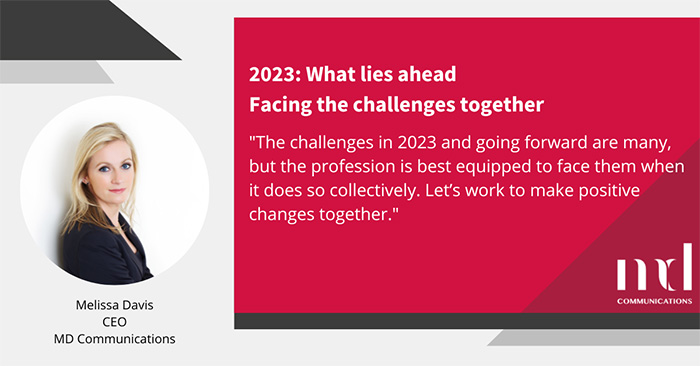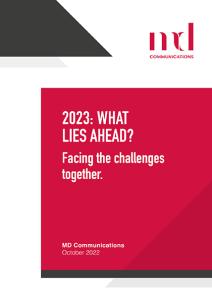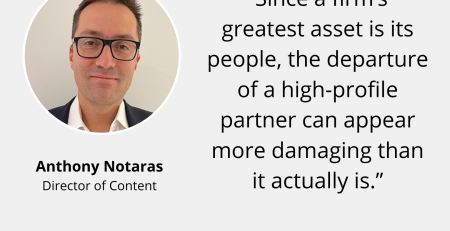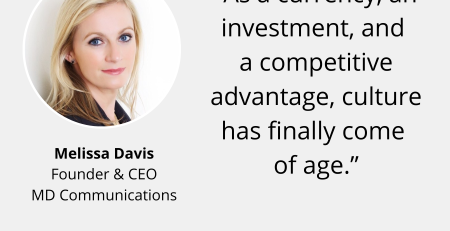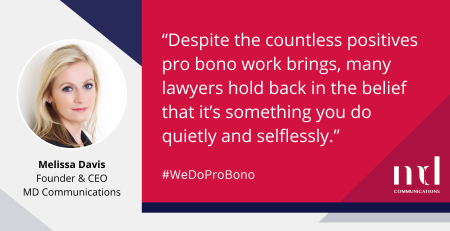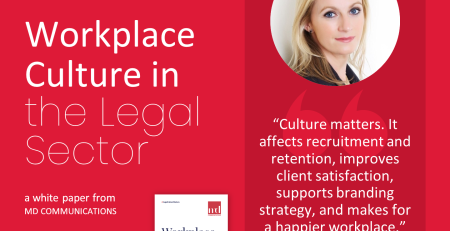Increasing concerns over recruitment and retention alongside close monitoring of the global political and economic situation are the main issues legal sector leaders have identified as threats in 2023 and beyond, according to a new report from specialist professional services consultancy MD Communications.
The report was launched today (31 October 2022) by the CEO of MD Communications, Melissa Davis, to be discussed at the International Bar Association Conference in Miami.
Cyber threats, a lack of diversity and inclusion, the increasing number of political attacks on lawyers, poor investment in the justice system and the mental health and wellbeing of lawyers were also key themes in the report titled ‘2023: What lies ahead? Facing the challenges together’.
The report features interviews with Managing Partners, GCs, journalists and CEOs alongside leading lawyers from the UK, Europe, Africa, America, UAE, and other jurisdictions, asking them to identify what threats the legal sector faces into 2023 and beyond.
In her foreword, Christina Blacklaws, the former Law Society President and current Chair of the LawtechUK Panel, welcomed the report, echoing the concerns of many over the war in Ukraine and concerns for the rule of law in authoritarian jurisdictions worldwide.
She also echoed the need for greater technology adoption within the legal sector, noting: “Legal tech has the potential to improve access to justice and improve client service – I hope we are not just running scared of technology’s potential.”
The increasingly challenging recruitment market was at the forefront of many legal sector leaders’ planning for the coming year.
MD Communications’ CEO Melissa Davis said this had created a ‘sellers’ market’ for those looking to move and placed colleague engagement and retention at the heart of firm’s long-term growth strategies.
Melissa Davis said: “The insights we gleaned highlighted common concerns for the future, but it’s clear that keeping and finding the people who will drive growth is top of the list.
“The current situation has created a market in which competition is more challenging than ever, with people looking increasingly at how businesses do business as much as what they do.”
“There is also no doubt that the legal sector is looking over its shoulder at the growing risk from various directions, including geopolitical uncertainty, political attacks on the industry and cyber threats. However, it is good to see the sector pulling together to address these issues, which I look forward to discussing during this IBA conference which will be welcoming over 8,000 lawyers from around the world.”
Former magic circle law firm Partner and IBA Law Firm Management Committee Officer Stephen Revell said: “The biggest threat to the legal sector is the fundamental aspect of recruitment and retention.
“The big worry is whether there are enough good people who want to join law firms and build a career in the legal profession. How can we help young people realise the attractiveness of the legal profession as a long-term career, so law firms have the people they need?”
Siobhan Lewington, Managing Director of global recruiters Fox Rodney, added: “In terms of talent retention, the market is the tightest we have seen it. The bottom line is that, with the hiring market so tight, firms are making significant efforts to retain their best talent using compensation and promotion as key tools to achieve this goal.”
Meanwhile, Sara Carnegie, Director of Legal Projects at the IBA, warned that continued gender and diversity challenges risked holding the sector back, saying: “It is not enough to show that your workforce has a high number of female lawyers if most are junior and not key decision makers or direction setters.
“We need to think beyond what happens in private law firms and consider women working at the most senior levels across in-house and public sector legal employment. If there is a difference, which we know there is, what they are doing, and how can we learn from them? Why should it only be possible to see gender parity in a government department and not in private practice or the senior judiciary?’
Lise Lotte Hjerrild, Partner, Horten, Chair of the IBA Women Lawyers’ Committee says one of the biggest threats to law firms is “the gender inequality currently characterising the legal profession. Over 50% of the world’s population is made up of women and the majority of the law students and graduates globally are female. However, women remain gravely underrepresented as opposed to their male counterparts at management level across all legal sectors.”
Nina Goswami, Head of Inclusion UK, Clifford Chance LLP, says “Addressing diversity and inclusion within the legal sector is more than the right thing to do – it is a business imperative. Our work is won through creating strong connections and there’s stacks of research out there that shows we best connect with people we can relate to. At Clifford Chance, this comes through in our ‘Responsible Business Strategy’.”
Addressing cyber concerns, Jason Romer, Global Managing Partner at offshore law firm Collas Crill, said: “There are some things that we can see and do stuff about and then there is the stuff that is almost too big to contemplate. In this second category is the cyber security risk that poses an existential risk to all law firms with the potential to damage reputations for a generation.”
Commenting on the importance of culture and values in the sector Jeff Davis, Chief Legal & Corporate Affairs Officer, Ontario Teachers’ Pension Plan Board says his team came out of law firms who didn’t always match their own values and now, as a client, they can do things to change the culture at those firms.
“My teams have found greater meaning in their roles by allocating our legal dollars to the brightest lawyers at firms which are leading on wellbeing and diversity, equality and inclusion, as well as any sense of purpose beyond billable hours. They want to be the catalyst to shaping our profession into becoming a better version of the one so many of us grew up in.”


